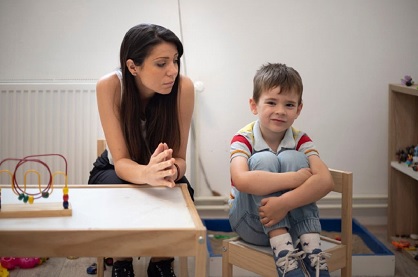Talk, Listen, And Discuss With Your Special Kids Regularly
 Taking care of special children requires genuine and special efforts. That is why special education programs always suggest parents make good communication with their children who are gifted. You being a parent must teach your child effective communication skills so that they can win all the challenges they shall be encountering in the long run. It is your responsibility to encourage communication with your special child and family members are also suggested to do the same.
Taking care of special children requires genuine and special efforts. That is why special education programs always suggest parents make good communication with their children who are gifted. You being a parent must teach your child effective communication skills so that they can win all the challenges they shall be encountering in the long run. It is your responsibility to encourage communication with your special child and family members are also suggested to do the same.
In order to boost your child's communication skills, paying attention to every minute detail like facial expression, eye contact, face-to-face conversation ability, etc., must be given. In fact, parents must observe the body language of specially-abled children very carefully because some kids having speech problems use gestures to express what is going on inside their minds.
Children with extraordinary gifts like ADHD, autism, hyperlexia, down syndrome, learning disabilities, etc., often find it difficult to communicate with other people. As a result, their socio-emotional growth lags behind unlike other ordinary kids. Therefore, special education needs teachers have taken the initiative to enhance the language skills of these children. Public schools, private schools, or any other special institutions having either inclusive regular classrooms or special classrooms are preaching the awareness of increasing communication skills among special kids.
WAYS HOW PARENTS CAN ENHANCE COMMUNICATION SKILLS WITH SPECIAL CHILDREN:
Speak with your child every day: Being parents, your job is to encourage your child having trouble in communication to begin or join in the conversation as much as possible. This will enable your kid to get along with you smoothly. You can also demonstrate how to make conversations relevant to what’s happening around your child. Besides, introducing new words and concepts all the time along with model phrases to your child can be perfect conversation starters.
Listen to your child carefully: Listening to your child is of utter importance because it gives him/her an impression that you value the conversation that is happening between you two. After your child has told you something, repeat back part of what your child said, and then counter-question: “Wow, it sounds like that science project is of great fun. What other project do you think would be pretty interesting? What different materials would you need to do so?”
Observe the body language: Kids who struggle with communication generally do not understand other kids’ nonverbal cues like gestures or body language. For your gifted child, you can demonstrate and explain body language as in, “I’m crossing my arms because I’m feeling angry,” or “When you roll your eyes at me, I feel disrespected.”
Read together: If you read with your child every day or on a regular basis, that creates another comfort zone for your gifted little one. Your child might the same book over and over again but please, do not be worried. Your child is developing a better understanding of the character and plots and vocabulary used when you read with him/her. Once you're done with finishing a book, discuss the setting, plot, characters, and any new words that might be in the story.
Have their input: A daily conversation between you and your kids should include involving them in a discussion where their opinions should be listened to carefully. The conversation can be as simple as which cake should you bake the next day, is it the chocolate one or the plum cake one. Ask your child’s opinion about relevant topics and such a discussion is good practice for having successful everyday conversations.
So these are the 5 most effective communication skills that special education programs recommend parents to practice with their specially-abled children. Such peaceful yet tactical conversational skills help kids who have special gifts or challenges like speech problems. In fact, introverted kids also open up when parents apply such conversational skills to improve their communication strength.












